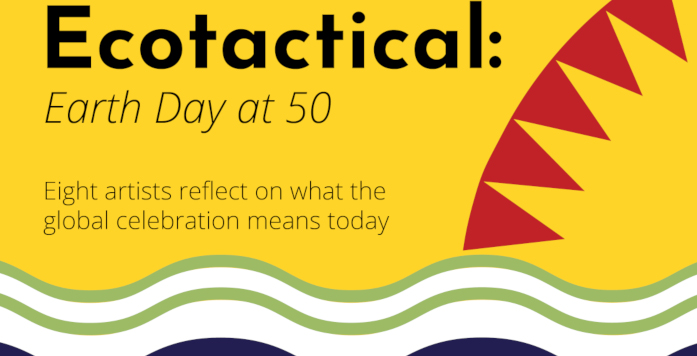 “There is no planet B” was one of the many slogans calling for environmental action during Earth Day in 2019. Even if this year’s celebrations of Earth Day’s 50th anniversary have been subdued in the wake of the worldwide pandemic, its ideals and insights are more vivid than ever before. After a significant delay, the Schuylkill Center for Environmental Education is presenting for this occasion the new exhibition “Ecotactical: Earth Day at 50,” which opened to the public on September 21, in its newly reopened Visitor Center.
“There is no planet B” was one of the many slogans calling for environmental action during Earth Day in 2019. Even if this year’s celebrations of Earth Day’s 50th anniversary have been subdued in the wake of the worldwide pandemic, its ideals and insights are more vivid than ever before. After a significant delay, the Schuylkill Center for Environmental Education is presenting for this occasion the new exhibition “Ecotactical: Earth Day at 50,” which opened to the public on September 21, in its newly reopened Visitor Center.
Since its beginnings, Earth Day has lobbied for an expansive view of the environment, ensuring both healthy habitats and healthy people, as well as fair housing, food access, and racial justice. The new exhibition “Ecotactical” offers a look into Earth Day’s legacy through the lenses of six artists whose works explore the connections between Earth Day activism since the 1970s and today’s concerns, responding in multimedia installations to the question of what this anniversary might mean 50 years later. At the Schuylkill Center’s gallery and on its trails, the artists present stories of nature, community, and environmental justice in Philadelphia and beyond. While reflecting on Earth Day’s origins, they underscore that memory and reflection lie side by side with activism and artistry at this milestone in its history.
The turmoil of our own time and the increasing urgency of the climate crisis gives the historical roots of Earth Day new relevance. “Both the artists and myself, we have been following and adjusting the exhibition to the ups and downs of COVID-19 over the last months,” says exhibition coordinator Liz Jelsomine. “Putting this into perspective, I believe the artists in ‘Ecotactical’ offer exciting new thoughts on the meaning of Earth Day today.”
Following in Earth Day’s creative footprints, the artist collaborative Tools For Action created inflatable sculptures for the People’s Climate March in 2014; they reference a “survival performance” the group Ant Farm presented in 1970. A documentation of their inflatables for today’s climate and earth-related demonstrations and actions is displayed in the gallery.
The activism of Tools for Action is mirrored in an outdoor installation along our trails, “For The Future” by Julia Way Rix, of cyanotype flags that draw on signs and slogans from recent climate strikes and environmental demonstrations. Also on the Center’s trails one can find fragile sculptures by Nicole Donnelly whose arrangements with invasive vines and handmade plant-based paper draw our attention back to the liveliness of nature.
“The objective is an environment of decency, quality, and mutual respect for all other human beings and all other living creatures,” said Senator Gaylord Nelson during Earth Day in 1970. These and other remarks and stories, particularly at Philadelphia’s ecological celebrations that were arguably the most vigorous in the nation, emerge from an archival arrangement by artist and teacher Kristen Neville Taylor. Her presentation incorporates historic ephemera and imagery of Earth Day’s demonstrations and activism in Philadelphia’s Powelton Village neighborhood, reminding us of the claims for environmental justice on our streets still today.
Another visual response is offered by local environmental educator and urban planner, Pili X, as he documents in a vivid photo album the rich community activities at the North Philly Peace Park. This self-identified ‘ecology campus’ champions alternative urban farming methods, fights for environmental and racial justice, and offers a holistic health approach in response to the Sharswood neighborhood’s profound needs for education, employment and food security. “We’re not going to be able to solve all these issues and answer all these problems overnight, but to begin to add some relief to people,” comments Pili X about his practice on
philadelphianeighborhoods.com.
Close beside that series is Sophy Tuttle’s display “Solastalgia,” which offers a shrine for healing and grief. Resembling a cabinet of curiosities, Tuttle’s work is a memorial to the estimated 150-200 species that go extinct every day, and a prompt to reimagine our domination-based relationship with our surroundings. The gallery presentation is rounded out by “Curious: Think Outside the Pipeline!” a family-friendly eco-musical by music duo Ants on a Log that follows a young girl’s journey into community organizing, and “Water Ways,” a series of illustrations by Meg Lemieur and Bri Barton that depict water, health, and justice in relationship to fracking.
Calling for action, reflection and humor, the artists’ responses in “Ecotactical” demand our attention and accountability to the past, present and future.
Due to COVID-19 safety measures, masks are required in the gallery, with no more than three people per group, at 6 feet apart. The Schuylkill Center looks forward to belatedly celebrating this year’s Earth Day anniversary with you.
By Tina Plokarz, Director of Environmental Art
 “There is no planet B” was one of the many slogans calling for environmental action during Earth Day in 2019. Even if this year’s celebrations of Earth Day’s 50th anniversary have been subdued in the wake of the worldwide pandemic, its ideals and insights are more vivid than ever before. After a significant delay, the Schuylkill Center for Environmental Education is presenting for this occasion the new exhibition “Ecotactical: Earth Day at 50,” which opened to the public on September 21, in its newly reopened Visitor Center.
“There is no planet B” was one of the many slogans calling for environmental action during Earth Day in 2019. Even if this year’s celebrations of Earth Day’s 50th anniversary have been subdued in the wake of the worldwide pandemic, its ideals and insights are more vivid than ever before. After a significant delay, the Schuylkill Center for Environmental Education is presenting for this occasion the new exhibition “Ecotactical: Earth Day at 50,” which opened to the public on September 21, in its newly reopened Visitor Center.